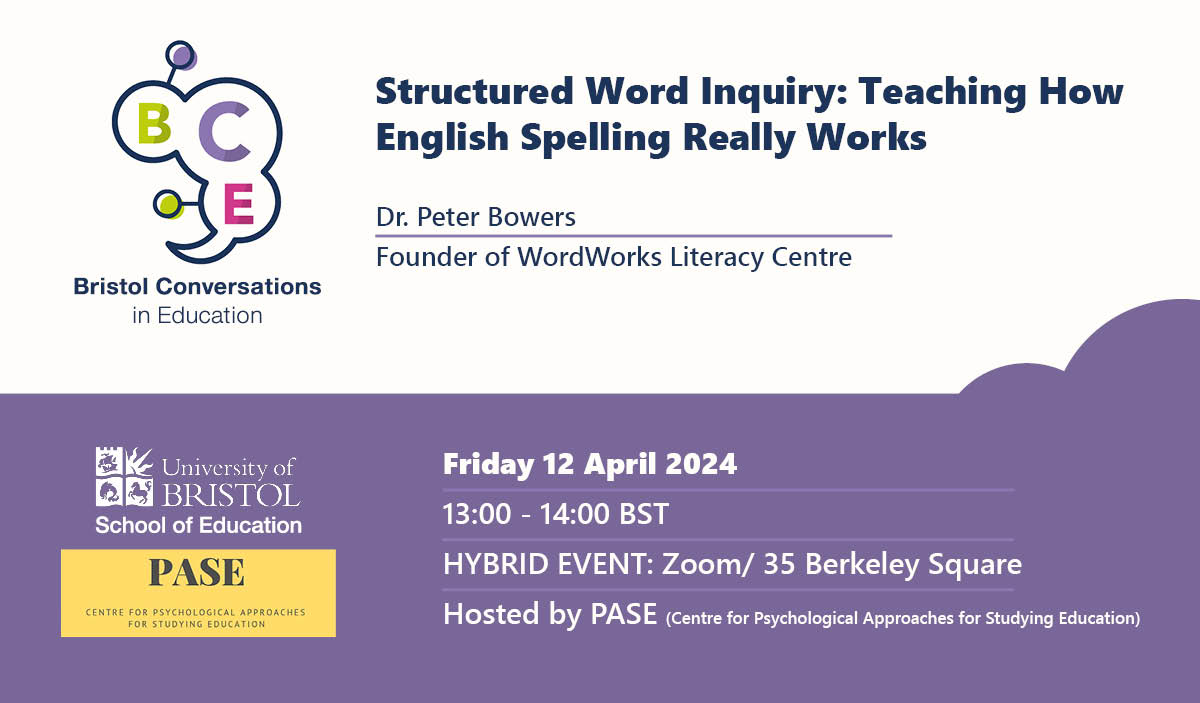 This event is part of the School of Education's Bristol Conversations in Education research seminar series. These seminars are free and open to the public.
This event is part of the School of Education's Bristol Conversations in Education research seminar series. These seminars are free and open to the public.
Hosted by the Centre for Psychological Approaches for Studying Education (PASE)
Speaker: Dr. Peter Bowers (Founder of WordWorks Literacy Centre)
It is often assumed that English spelling is a frustrating system with “too many ways to spell the sounds.” Resources and training considered to be “best practice research-based” present words like does, sign, been, two, people, and rough as having “irregular letter-sound correspondences” children have to memorize. All major theories of reading agree instruction should target high quality mental representations of the spellings, pronunciations and meanings of words (Perfetti, 2007) that become “sight words” (Ehri, 1998, 2014). The less students need to struggle to identify a word when reading or the spelling when writing, the more cognitive resources are available for comprehension.
Structured Word Inquiry (Bowers & Kirby, 2010) (SWI) uses a scientific inquiry approach to give teachers and students the tools to study how spelling really works. Like systematic phonics instruction, teaches what the grapheme-phoneme correspondences are. But SWI also explicitly teaches the role of “spelling-meaning correspondences” that come from morphology and etymology.In this session, Dr. Bowers will model how SWI draws on linguistic understanding to teach children to understand the spellings typically treated as irregular. He shows how this approach provides a means of building understanding of how our spelling system really works for generative learning. He will also show how the principles of SWI instruction fit with the recommendations of current research theory.
To get an idea of this approach, see an example of Dr. Bowers teaching the spelling of “does” here.
See a TEDx Talk explaining many such words here.
Much more information and research can be found on the WordWorks website.
Peter Bowers, Ph.D., is a researcher, author, educator and founder of WordWorks Literacy Centre. His vocabulary intervention (Bowers & Kirby, 2010) introduced the phrase, “structured word inquiry.” That study with grade four and five students found generative vocabulary learning for the SWI condition over controls. He has published widely on SWI and the effects of morphology instruction. Counter to typical assumptions, younger and less able students gain the most from including morphology in literacy instruction. Further the greatest effects of morphological instruction are for phonological gains. Recognizing the importance of the work of Dr. Peter, Louisa Moats invited him to film a presentation on SWI that is now required study for LETRs trainers Bowers has been invited to present Keynote addresses at major literacy conferences in North America (e.g. IDA and ASHA) the UK (PATOSS) and Australia (ALEA) and has worked with educators and students in schools around the world for over a decade.
